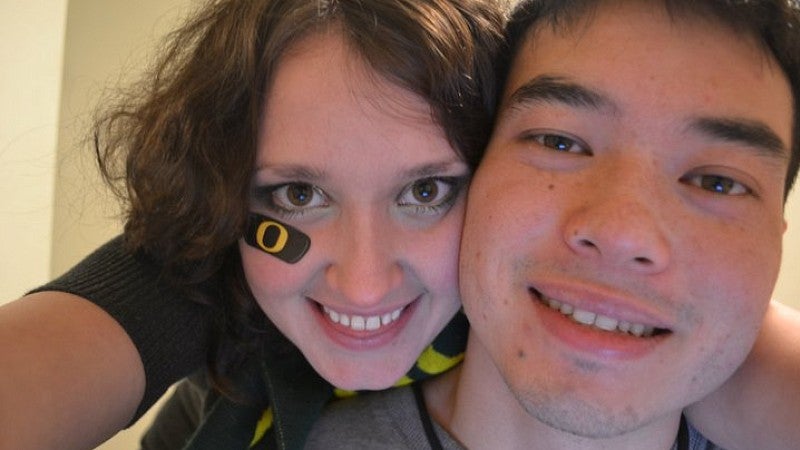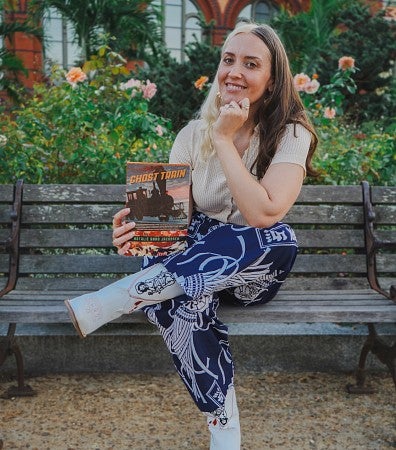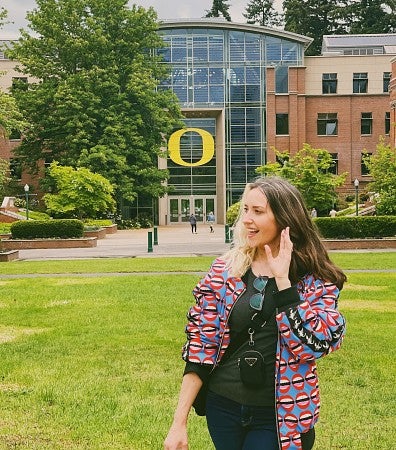
June 27, 2025 - 9:45am
For Natalie Jacobsen, the path from the University of Oregon to becoming director of marketing and communications at Airlink, a humanitarian aviation nonprofit, has been anything but linear. Still, it brings together a lifetime of passions, including writing, activism and global service.
Jacobsen graduated from the UO in December 2010 after exploring multiple majors before landing on cinema studies and media history. She minored in East Asian studies.
“I changed majors a couple of times. I was on a true journalism track. I wound up kind of pivoting into more cinema history, media in general, and that actually contributed to a more well-rounded education for me and opened up more opportunities for careers,” she said.
That well-rounded education took her across the globe. Shortly after graduation, Jacobsen moved to Japan, where she worked in media, writing for publications, contributing to music videos and exploring photojournalism. Her UO courses, including Japanese language, history and cinema studies, played a pivotal role.
“I credit a lot of that different experience to classes I took at UO that set me up for that,” she said.

After some time in Japan and Hong Kong, respectively, she moved with her husband (also a Duck, Thornton “Max” Hare, was a double major in political science and business administration) to Charlottesville, Virginia. There, Jacobsen used her international writing experience to transition into journalism. But after witnessing the 2017 Unite the Right rally and its aftermath, she began to reconsider her role.
“My upbringing revolved a lot around my mom taking our family to volunteer, canvassing for political candidates while at UO and finding ways to help those in need. My dad was a pilot, saw so much of the world and delivered humanitarian aid to remote places. I grew up wanting to inspire others to take action and write to inform and persuade,” she explained. “Seeing our community directly impacted by the out-of-town protesters brought me back to my upbringing; I wanted to go back into making a difference rather than writing about it.”
The realization led her into the nonprofit sector and eventually to government communications in Washington, D.C. Over seven years and two administrations, she worked across various departments and campaigns. Then, in 2023, an unexpected opportunity brought everything full circle.
“Someone reached out to me who had seen my experiences and asked me if I was looking for a new job... and turns out it was from Airlink. Suddenly, it was all coming together in this one role, which I'm doing now,” she said.

Her storytelling journey didn’t stop at professional communications. Last year, Jacobsen published her debut novel “Ghost Train,” a historical fiction story she began writing while still at the UO. Set in 1877 Kyoto, the novel follows the daughter of a samurai navigating the loss of tradition, culture and women’s rights during Japan’s Meiji era.
“I kind of took this metaphor of a loss of history, a loss of rights, a loss of folklore and paralleled it with today and asked, ‘Who is the victim?’ And typically, it’s vulnerable people, including women,” said Jacobsen.
Writing while maintaining a full-time career wasn’t easy. “It was challenging. I wasn’t able to write every day,” she said.
But the COVID-19 pandemic gave Jacobsen a chance to return to the project and finally bring her story to life.
Whether writing fiction or coordinating humanitarian aid, Jacobsen’s motivation remains the same. She uses stories and strategy to connect people and inspire action.
“I've learned that it takes community more than anything. It takes a village to make a change, and that’s been the rewarding part,” Jacobsen said.
Her advice for current UO students?

“Don’t be too hard on yourself if you don’t feel like you know what you want to do because college is about finding out what that is. I came in with an idea, and I came out with a totally different path, and it’s all worked out. It’ll always work out,” she said.
For aspiring writers and communicators, she encourages getting started now, no matter how small.
“Even if you don’t publish anything now or for another decade or two decades, it’s okay. Just start writing. The way that you tell stories and approach life will give you more insights into who you are and what your superpowers are.”
—By Harper Wells, College of Arts and Sciences
